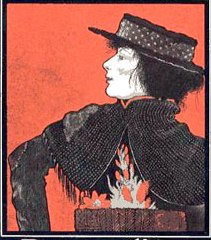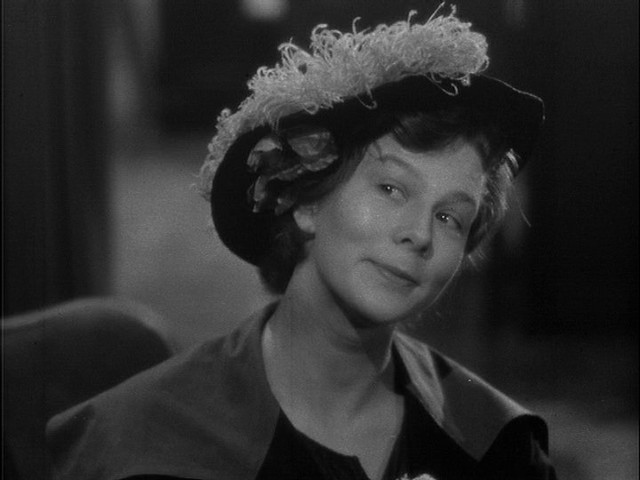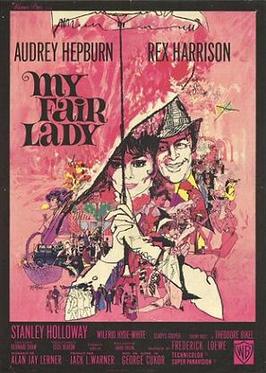PYGMALION VS. MY FAIR LADY
The George Bernard Shaw play Pygmalion was a wild success. After several attempts at adapting Pygmalion to the musical stage the team of Alan Jay Lerner & Frederick Lowe managed to with My Fair Lady.
Both works remain popular today as do the film versions of both Pygmalion and My Fair Lady. Today, I will look at both of them briefly and then compare the two.
First, the plot.
Haughty phonetics Professor Henry Higgins makes a wager with the nearest thing he has to an equal, Colonel Pickering, that he can turn Cockney flower-girl Eliza Doolittle into an elegant lady. Eliza sees this passing comment as a serious offer and goes to Higgins for elocution lessons. She suffers endlessly through the rigors Higgins puts her through and endures the misadventures of her lackadaisical father Alfred, but ends up indeed an elegant lady. Wealthy dilettante Freddy Eynsford-Hill becomes besotted with Eliza but she isn't interested.
Whether Professor Higgins, who has contempt for everything and everyone who is not Professor Higgins, has actually fallen in love with Eliza is left forever ambiguous.
As a side note, I say he did, but that's just me.
Now, on to the comparisons.
BEST HENRY HIGGINS
Leslie Howard
Rex Harrison
I am not a fan of Rex Harrison or his Henry Higgins. To be fair, the role required him to be haughty, arrogant and thoroughly unlikable, which Harrison's version was. I dislike his 'talking on pitch'. I intensely dislike that he won the Best Actor Oscar for perhaps the worst performance of the five nominated that year.
The mind boggles that Harrison's non-singing Higgins beat out Anthony Quinn and Peter Sellers in two of their most iconic performances (Zorba the Greek and Doctor Strangelove respective). The mind boggles that Harrison's non-singing Higgins beat out both Richard Burton and Peter O'Toole in Becket, where they too gave masterful performances. The fact that Sellers, Burton and O'Toole would never win Oscars while Harrison holds what should have been any of theirs is downright scandalous.
However, he was much better than Howard, who was to my mind too theatrical in Pygmalion. A lot of time Howard seemed to make gestures and faces that bordered on the laughable. Harrison, for whatever faults he may have in My Fair Lady, did not hit a wrong note acting-wise (pun unintended). He was perfectly crabby and cantankerous as Higgins, where his cluelessness about his cruelty came across as genuine versus affected.
BEST ELIZA DOOLITTLE
Wendy Hiller
Audrey Hepburn
The fact that Audrey Hepburn did not sing in no way affects my selection. No one, for example, goes on about how Deborah Kerr didn't belt out any numbers herself in The King & I. Why Hepburn has been raked over the coals for something out of her control is a perpetual mystery.
I think Hepburn did a pretty solid job as Eliza Doolittle. My issues with Hepburn however in retrospect is that she comes across as frankly too posh and elegant to be this simple Cockney girl. Once she is the refined Eliza then Hepburn is spot-on, but sometimes as the guttersnipe Hepburn seems absurd. It reminds me of a line from Victor/Victoria when Victoria suggests that with a little practice she can refine her operatic tones to a cabaret style.
"That is like saying that with a little practice a nun can become a streetwalker" is the sarcastic reply.
The dubbing also hurts Hepburn, but not in the way one might think. Marni Nixon dubbed Hepburn in My Fair Lady in the same way Nixon dubbed Kerr in The King & I and dubbed Natalie Wood in West Side Story. Nixon had a very posh, polish and refined tone. In a case of 'with a little practice', Nixon's clear, crisp voice was laughable as the Cockney. It was too perfect, too refined, too elegant to be believable.
Hiller, however, was perfectly believable as Eliza. She keeps that balance between class and trash, between a lowly girl and the educated woman. She had a natural way with both the comedy and the drama of the role, a very difficult thing to do. Hiller is so good as Eliza that you believe the transformation versus Hepburn, who despite her considerable talent was always a bit too posh throughout.
BEST COLONEL PICKERING
Scott Sunderland
Wilfrid Hyde-White
I think one can make a safe bet that Sunderland did not leave much of an impression. He was proper and polite in the role, but Hyde-White added an element of perpetual befuddlement. Hyde-White is forever bumbling and tut-tutting about, constantly shocked at the goings-on about him. He seems to be almost deliberately doing a caricature of the veddy proper Englishman.
To be fair Sunderland's version seems to have some sense in him while Hyde-White's version does not. However, Hyde-White's constantly "REALLY, Higgins!" manner made for quite entertaining viewing.
BEST FREDDY EYNSFORD-HILL
David Tree
Jeremy Brett
I confess that my eternal love for Brett as the definitive Sherlock Holmes may play a part in my selection. This is especially true given that Tree was quite good as Freddy, who was probably more insipid and besotted than Brett's version.
However, Brett has some qualities that push him over the goalpost. For example, he has On the Street Where You Live, a non-love song that is part of an extraordinary songbook (even if he too was dubbed). I think that Brett's Freddy was not brain-dead just in love elevates him too. Brett brings intelligence to the role and makes Freddy not an absolute idiot that Tree made him. Instead, Brett makes him just a young foolish man in love.
BEST ALFRED DOOLITTLE
Wilfrid Lawson
Stanley Holloway
Lawson has a distinct disadvantage in that his Alfred Doolittle was on the screen extremely briefly while Holloway had a larger and more dominant role. Like Brett, Holloway has the benefit of some wonderful songs to perform: With A Little Bit of Luck and Get Me to the Church on Time, perhaps two of the best songs in My Fair Lady. Unlike Brett, Holloway had the advantage of singing his numbers, having originated the role on the stage and recreating it for the film version.
Lawson also had a drawback in that his Alfred Doolittle was pretty much a nonentity. He just appeared and disappeared. Holloway on the other hand gave Alfred a personality: a charming rogue whom we shouldn't like but end up quite fond of. He's a tramp, but we love him.
BEST WRITING
Pygmalion
My Fair Lady
Perhaps here too the fact that Pygmalion was co-written by George Bernard Shaw (and won an Oscar for it) plays a part in selecting it over the nominated My Fair Lady. However, I think that Pygmalion is better written is that it tells its story simply.
There does not seem to be any fat in Pygmalion. There is no superfluous aspect in Pygmalion, which is something I cannot say with My Fair Lady. Some of the songs felt as if the movie was stretched with Just You Wait in particular coming to mind. To be fair, musical adaptations will almost always be longer than their original stage/film productions because singing takes longer than talking. However, My Fair Lady just feels longer, feels stretched out.
BEST DIRECTION
Anthony Asquith & Leslie Howard (Pygmalion)
George Cukor (My Fair Lady)
As I look at the directing I go back to Cukor and how well he handled the massive scope of My Fair Lady's production. It is not theatrical as Pygmalion was, and in perhaps the moments that it was theatrical such as the Ascot Gavotte it is meant to be theatrical. Asquith and Howard, sharing directing credit, did not balance things as well as Cukor. In particular I return to Howard's performance, which I figure was directed by Asquith. If so, he could not get Howard to tone it done. If Howard directed himself, he let his ego run away with him.
Looking back at the performances, all from Pygmalion have faded from the general public's mind save for Hiller. Sadly, if Hepburn's performance is remembered, it is in part because of the faux-scandal with regards to her lack of singing. Acting-wise, I think My Fair Lady is better.
Cukor also has the benefit of that vast canvas to paint with. He could have big dance numbers, elegant costumes and sets and visual flairs Pygmalion could not afford. To its credit My Fair Lady does not feel like a big lumbering thing in the way something like Doctor Doolittle does.
Finally, while not strictly related as to why I chose Cuckor over Asquith & Howard, I think he won because despite making an extraordinary body of work: Little Women, The Philadelphia Story, Dinner at Eight, The Women, Adam's Rib, 1954's A Star is Born), he had never won. Whether it was a de facto Lifetime Achievement win or for the specific film I don't know but it is surprising to think My Fair Lady is Cukor's only Best Director win.
BEST VERSION
Pygmalion
My Fair Lady
By a vote of 5 to 2 My Fair Lady comes out on top. Truth be told I found both of them very good films and even gave them the exact same score of B-. However, I think My Fair Lady has held up longer, probably due in no small part because of the songbook. The songs in My Fair Lady are so wrapped in our lexicon that you don't even have to sing them but speak them.
"The rain in Spain stays mainly in the plain", "I could have danced all night", "I've grown accustomed to your face", "Get me to the church on time". Those could be songs or phrases. My Fair Lady has a bigger cultural impact than Pygmalion. It's more likely one has seen My Fair Lady performed in high schools and community or regional theater than Pygmalion.
Except in the world of Love, Simon, where high schools perform Cabaret instead, but I digress.
Apart from that, I cannot help falling for My Fair Lady's charms over Pygmalion's. The latter is by absolutely no means bad, but my goodness the former is simply too charming to forget.
I think both films are equally good, but I think that My Fair Lady is the better version.






_poster.jpg)


No comments:
Post a Comment
Views are always welcome, but I would ask that no vulgarity be used. Any posts that contain foul language or are bigoted in any way will not be posted.
Thank you.